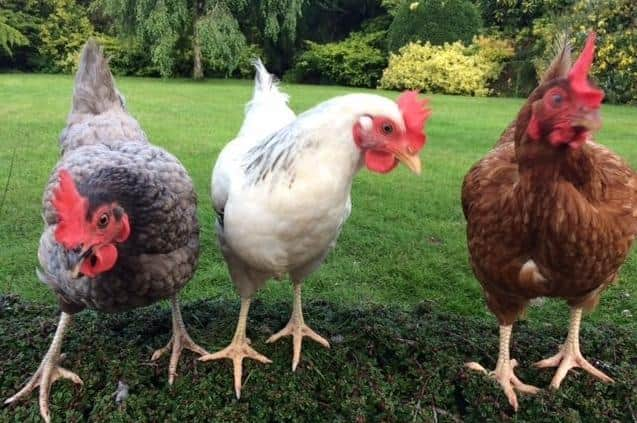Russia-Ukraine war: UFU warns price for chicken and eggs will have to increase as feed and energy costs soar
and live on Freeview channel 276
The Ulster Farmers’ Union (UFU) says its poultry producers are becoming increasingly concerned regarding the financial pressures that the industry is being subjected to.
President Victor Chestnutt said poultry producers across Northern Ireland are on edge about soaring energy and feed prices that are putting the cost of production through the roof.
Advertisement
Advertisement
“We understand that processors have been engaging with retailers to ensure that these costs are passed up the supply chain and we’re fully supportive of these discussions,” he said. “Poultry producers should not have to bear the brunt of skyrocketing increases alone when working to produce high-quality produce for consumers.


“We encourage all retailers and consumers to be mindful of the skyrocketing production costs that are being forced upon our members. They take pride in producing food to world-leading standards for the public to enjoy but during this extremely difficult period they need to be supported to ensure they can continue feeding the nation. The stark reality is, to ensure a continued supply of food in our shops a fair margin must be attainable for farmers, but at this stage, that is not the case for all of our members.”
UFU Policy Officer David McClure said the price of grain is almost double what it would have been since the Ukraine war started.
“Wheat or barley are cheaper feeds that typically average £180 to 220 a tonne but are now costing £400 a tonne,” he told the News Letter. Ukraine is known as the bread basket of Europe because its soil and climate are so well suited to growing grain, he notes.
Advertisement
Advertisement
“There is such a huge amount of grain that comes out of Ukraine.”
Russia is also a source of fertilizer that is also needed to grow the grain. And in the UK 30 to 40% of wood pellets - used to heat chicken houses - would have come from Russia before the war.Farmers that use gas are also facing surging prices and in some cases electricity prices have doubled, he adds.
“The price being paid to farmers will have to increase in order to sustain them,” he said. “Farmer, processor, retailer and consumer - somewhere or everywhere across that supply chain there is going to have to be pain absorbed. We can’t expect to buy chicken and eggs at the same price we did six months ago.”A chicken farmer with over 100,000 birds told the News Letter that most chicken farmers use wood pellets to heat their buildings.
“The big challenge is that you can’t get wood pellets - they are very scarce,” he said. “Most large chicken farmers use them to heat their chicken houses, but they are mainly supplied from easter Europe and are currently very difficult to source.”He buys his feed from Moy Park and also supplies them with his produce.
Advertisement
Advertisement
“Feed prices are through the roof - the margins now are so tight. Prices began to surge about a month ago, by £70-80 per tonne.””Everybody is concerned all the time. People need to buy food to put on their tables but the question is, what price will it be?”Most chicken farmers in NI sell their chickens to Moy Park, which pay higher prices to the farmers as the price of feed goes up.
The Department of Agriculture, Environment and Rural Affairs (DAERA) announced today that it has established a dedicated taskforce with industry representatives in response to the severe market disruptions caused by the war in Ukraine.
DAERA the increased costs of feed, fuel and fertiliser cannot be absorbed by farmers and must be transmitted down the supply chain quickly if the economic viability of primary production is to be sustained.
During the first meeting of the taskforce on Tuesday, representatives from banks, producer and supply chain organisations and farming unions acknowledged the industry needs to prepared for further disturbances as a result of a prolonged conflict in Ukraine
Advertisement
Advertisement
The taskforce will aim to jointly deliver technical support to the agri-food sector during this crisis, as well as ensuring farmers have access to timely and relevant advice to ensure they can make sound decisions now and therefore reduce impacts later in the year.
CAFRE advisers have already been in contact with farmers and growers to assess the situation on-farm in relation to feed and fertiliser. There is also a dedicated page on the CAFRE website dealing with the efficient use of fertilisers and manures.
The taskforce is now developing an action plan which will help inform the key advisory messages that need to be communicated out to the wider agriculture industry. Over the coming weeks and months there will be a series of in-person events as well as webinars and online focussed suppor